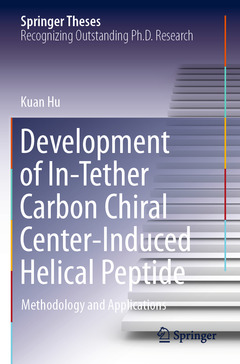Description
Development of In-Tether Carbon Chiral Center-Induced Helical Peptide, 1st ed. 2021
Methodology and Applications
Springer Theses Series
Author: Hu Kuan
Language: English
Subjects for Development of In-Tether Carbon Chiral Center-Induced...:
Publication date: 01-2022
102 p. · 15.5x23.5 cm · Paperback
Approximative price 179.34 €
In Print (Delivery period: 15 days).
Add to cartPublication date: 01-2021
Support: Print on demand
Description
/li>Contents
/li>Comment
/li>
This book focuses on the development of stapled peptides, a novel molecular modality used to regulate aberrant intracellular protein?protein interactions (PPIs). The author designs and presents a novel helical peptide stabilization methodology by constructing a chiral cross-linker moiety, namely ?chiral center induced peptide helicity (CIH)?. The book demonstrates that a precisely positioned carbon chiral center on tether can decisively determine the secondary structure of a peptide, and that the R-configured peptide is helical, while the S-configured peptide is non-helical. Further, it reports that helicity-enhanced R isomer peptides displayed significantly enhanced cell permeability and target binding affinity, as well as tumor inhibition efficiency, in comparison to S isomer peptides. The book will not only advance readers? understanding of the basic principle of stapled peptides, but also accelerate the clinical transformation of stapled peptide drugs.
Introduction.- Method to construct in-tether chiral center constrained helical peptide.- Application in disrupting p53/MDM2 protein-protein interactions.- Fabrication of nanomaterials with in-tether chiral center constrained helical peptide.
Nominated as an outstanding PhD thesis by Peking University
Reports on important progress in the study of stabilized peptide drugs
Introduces applications in cancer stem cell therapy and self-assembly for novel nanomaterials
Includes a diversity-oriented synthesis methodology for constructing stabilized peptides and a clear study of the correlation between peptides’ structure and their biophysical/biochemical properties
These books may interest you

Peptides: Chemistry and Biology 105.49 €

Cyclic Peptide Design 189.89 €


